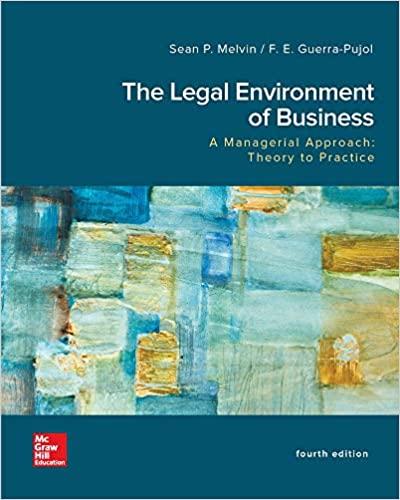Question
Arbitration is an alternative form of dispute resolution. In theory and in practice it often is intended to save time and money and achieve better
Arbitration is an alternative form of dispute resolution. In theory and in practice it often is intended to save time and money and achieve better outcomes than going to court. If you haven't actually been involved in arbitration, you might be surprised to know you have likely agreed to it many times without knowing it. Most cell phone, cable, Internet, online shopping, and credit card agreements now contain arbitration clauses. In the fine print of their service agreements are buried the words, "The company may elect to resolve any claim by individual arbitration." This means the company reserves the right to settle any dispute you raise as an individual, or as a group via class-action, using arbitration. You essentially forfeit your constitutional rights to sue, and agree to be bound by the decision of a third party, often hired by the company against which you have a complaint.
A 2015 investigation by The New York Times revealed that such clauses are increasingly inserted in consumer and employment contracts as a way to work around the courts, limiting consumers' recourse both as individuals and collectively in class-action suits. Proponents of the bans say arbitration clauses work just as intended: They save time and money by protecting companies from frivolous lawsuits, while at the same time providing a less costly, faster, and less resource-intensive route to potential satisfaction for customers.
Opponents also have much to say. They often refer to such clauses as "get out of jail free cards" for large corporations. Moreover, many critics claim that rules of arbitration favor companies, which have skill and experience in arbitrating as well as financial resources that the vast majority of consumers lack. The deck seems stacked in the big companies' favor.
The purpose of class-action suits is to allow individuals with relatively small claims to band together and achieve some sort of recourse against an offending company. But courts have thrown out numerous class-action claims because of arbitration clauses, including a complaint against a travel-booking website for conspiring to fix hotel prices, another against Goldman Sachs claiming sex discrimination, and still another against Taco Bell for discriminating against African-American employees. William Young, a federal judge in Boston, said of arbitration clauses, "Ominously, business has a good chance of opting out of the legal system altogether and misbehaving without reproach."
There is no official tracking system for arbitration that tallies the number of cases, success rates, or amount of money awarded. But the Times' investigation revealed that between 2010 and 2014 a total of 1,179 class-action suits were filed against companies. Eighty percent were pushed to arbitration by judges. In a single year, 2014, judges ruled against 134 of 162 class-action filings, moving them to arbitration or causing the plaintiffs to drop the cases altogether. The story of individual consumer plaintiffs is even more telling. Between 2010 and 2014, Verizon faced only 65 consumer arbitrations, despite having 125 million subscribers. Time Warner Cable had only seven from among its 15 million customers. It thus seems that while arbitration is a contractual possibility, relatively few individual consumers utilize it, and groups of consumers have no choice but to do so.
- What Should Be Done?
- Nothing. Allow companies to include arbitration clauses in consumer agreements and contracts as they choose. Explain your reasoning.
- Modify the clauses to better protect consumers. Explain your recommended modifications.
- Take away arbitration clauses. Justify.
Step by Step Solution
There are 3 Steps involved in it
Step: 1
This question appears to seek opinions on arbitration clauses and potential steps to address the issues outlined Here are potential answers reflecting ...
Get Instant Access to Expert-Tailored Solutions
See step-by-step solutions with expert insights and AI powered tools for academic success
Step: 2

Step: 3

Ace Your Homework with AI
Get the answers you need in no time with our AI-driven, step-by-step assistance
Get Started


